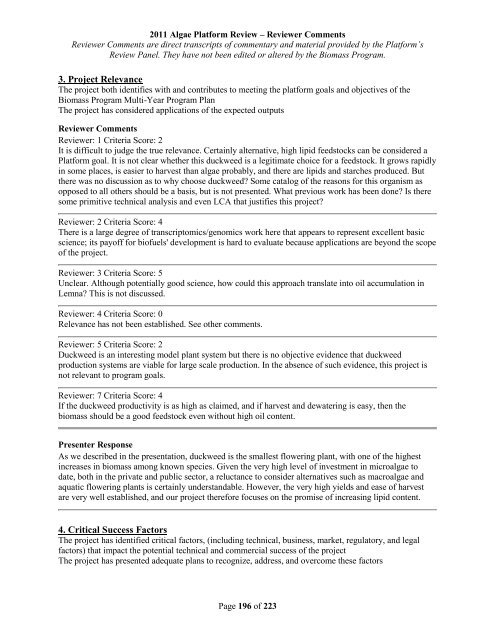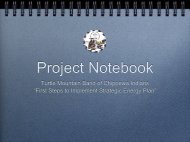Reviewer Comments - EERE
Reviewer Comments - EERE
Reviewer Comments - EERE
You also want an ePaper? Increase the reach of your titles
YUMPU automatically turns print PDFs into web optimized ePapers that Google loves.
2011 Algae Platform Review – <strong>Reviewer</strong> <strong>Comments</strong><br />
<strong>Reviewer</strong> <strong>Comments</strong> are direct transcripts of commentary and material provided by the Platform’s<br />
Review Panel. They have not been edited or altered by the Biomass Program.<br />
3. Project Relevance<br />
The project both identifies with and contributes to meeting the platform goals and objectives of the<br />
Biomass Program Multi-Year Program Plan<br />
The project has considered applications of the expected outputs<br />
<strong>Reviewer</strong> <strong>Comments</strong><br />
<strong>Reviewer</strong>: 1 Criteria Score: 2<br />
It is difficult to judge the true relevance. Certainly alternative, high lipid feedstocks can be considered a<br />
Platform goal. It is not clear whether this duckweed is a legitimate choice for a feedstock. It grows rapidly<br />
in some places, is easier to harvest than algae probably, and there are lipids and starches produced. But<br />
there was no discussion as to why choose duckweed? Some catalog of the reasons for this organism as<br />
opposed to all others should be a basis, but is not presented. What previous work has been done? Is there<br />
some primitive technical analysis and even LCA that justifies this project?<br />
<strong>Reviewer</strong>: 2 Criteria Score: 4<br />
There is a large degree of transcriptomics/genomics work here that appears to represent excellent basic<br />
science; its payoff for biofuels' development is hard to evaluate because applications are beyond the scope<br />
of the project.<br />
<strong>Reviewer</strong>: 3 Criteria Score: 5<br />
Unclear. Although potentially good science, how could this approach translate into oil accumulation in<br />
Lemna? This is not discussed.<br />
<strong>Reviewer</strong>: 4 Criteria Score: 0<br />
Relevance has not been established. See other comments.<br />
<strong>Reviewer</strong>: 5 Criteria Score: 2<br />
Duckweed is an interesting model plant system but there is no objective evidence that duckweed<br />
production systems are viable for large scale production. In the absence of such evidence, this project is<br />
not relevant to program goals.<br />
<strong>Reviewer</strong>: 7 Criteria Score: 4<br />
If the duckweed productivity is as high as claimed, and if harvest and dewatering is easy, then the<br />
biomass should be a good feedstock even without high oil content.<br />
Presenter Response<br />
As we described in the presentation, duckweed is the smallest flowering plant, with one of the highest<br />
increases in biomass among known species. Given the very high level of investment in microalgae to<br />
date, both in the private and public sector, a reluctance to consider alternatives such as macroalgae and<br />
aquatic flowering plants is certainly understandable. However, the very high yields and ease of harvest<br />
are very well established, and our project therefore focuses on the promise of increasing lipid content.<br />
4. Critical Success Factors<br />
The project has identified critical factors, (including technical, business, market, regulatory, and legal<br />
factors) that impact the potential technical and commercial success of the project<br />
The project has presented adequate plans to recognize, address, and overcome these factors<br />
Page 196 of 223




